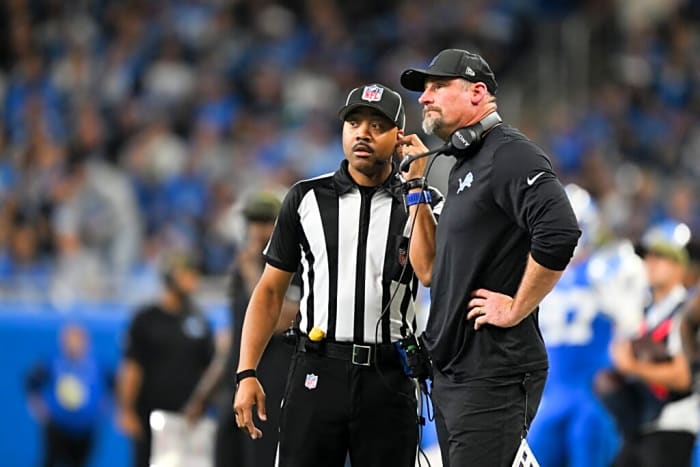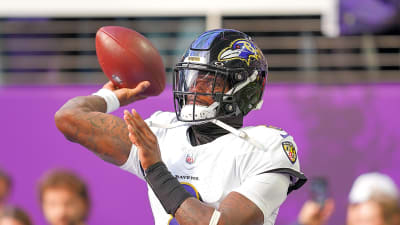
In recent years, former spring football stars Brandon Aubrey, Jake Bates, and Andre Szmyt have established themselves as some of the NFL’s most reliable place-kickers. Along with other highly-regarded spring talents, including defenders Jalen Redmond and Dondrea Tillman, and return specialist KaVontae Turpin, these established players paved the way for several other skilled UFL newcomers who are finding their place on team rosters this season. But in addition to being a talent resource, there are other ways the spring league could benefit the NFL
What The UFL Does Better Than the NFL
As a “beta test” site for continuous improvement, the UFL could lead the way for revising or adapting league rules. For example, one of the more progressive UFL rules that should be adopted by the NFL immediately is the use of booth review instant replays for penalties.

How The UFL Can Inspire Positive NFL Changes
The UFL has found an ingenious way to eliminate erroneous or missed penalty calls that have often negatively impacted a game’s outcome. A perfect example is the January 2025 AFC Championship game between the Kansas City Chiefs and the Buffalo Bills. Late in the game, Bills quarterback Josh Allen was denied a critical fourth-down conversion. CBS rules analyst Gene Steratore and the game’s announcers agreed Allen achieved the necessary yardage for a first down. But the refs upheld the call on the field. That officiating error led to Buffalo’s premature exit from the playoffs. Fans were enraged, and social media erupted with conspiracy theories accusing the refs of favoring the Chiefs. If the league had adopted the UFL’s penalty review procedure, this would have been caught during the game and corrected immediately.
How the Detroit Lions Have Been Affected This Season
Another team that has frequently found itself on the wrong side of officiating errors this season is the Detroit Lions. One Lions’ penalty reignited the furor over the conspiracy theories against the Chiefs. Lions safety Brian Branch’s post-game punch of wide receiver JuJu Smith-Schuster resulted in officials slapping him with a one-game suspension without pay. Although video footage later revealed that Smith-Schuster was the provocateur, he was never suspended or fined. But Branch’s suspension was upheld on appeal.
The missed call occurred late in the fourth quarter when Smith-Schuster delivered a harsh blindside block to Branch. His aggressive, dangerous act was never flagged. If the refs had been paying attention, the Chiefs would have been hit with a 15-yard unnecessary roughness penalty. Perhaps that missed penalty could have led to a Lions score, resulting in a different outcome. But regardless of Smith-Schuster’s provocative blindside hit, Branch knows his conduct was inappropriate and unprofessional. It was an emotional outburst that wound up hurting his team because of the one-game suspension.
Two other game-altering Lions penalty calls occurred during the recent Philadelphia Eagles victory. Late in the game, officials flagged Detroit cornerback Rock Ya-Sin for an egregiously bad defensive pass interference call. NBC color analyst Cris Collinsworth ripped the officials for the controversial penalty flag, “Oh, come on! Come on! That is terrible! That is an absolutely terrible call that’s going to decide this football game! If anything, it’s an offensive push!”
When Officials Issue Rulings Outside Their Lane
Furthermore, coaches catching officials making erroneous penalty calls is increasing. A recent article in ESPN found that NFL coaches’ challenges are succeeding more frequently than they did last season, at a rate of 60% from 39%. This is due to a change during the offseason that allows coaches and staff personnel in the coaching booth to view the same camera feed as the replay official. Consequently, with the enhanced equipment view and superior technology, the coaches can immediately challenge the call and correct the situation with a reversal.
Sometimes, the NFL rules create controversy by requiring officials to arbitrarily sanction behaviors that shouldn’t warrant a flag. During the Lions-Eagles game, an exuberant Jameson Williams celebrated his 40-yard touchdown by humping the goalpost. The Lions’ wide receiver’s harmless act elicited a 15-yard penalty that resulted in a missed extra point from Bates.
Rules about touchdown celebrations should focus on acts that are potentially dangerous to athletes or others in the stadium. Any act that potentially condones, incites violence, or taunts the opposing team should similarly be sanctioned. But since when did the NFL refs become the morality police? College football games recognize the difference between violence and good-natured, humorous celebrations. Sanctioning humorous, entertaining celebrations that don’t pose a threat or harm anyone is absurd. This rule needs to change.
How The UFL Mitigates The Risk of Human Error
However, the UFL has found a way to reduce human error by implementing full officiating transparency by having one of their VPs of Officiating, Dean Blandino or Mike Pereira, carefully scrutinize every call from their New York Sky Box. Giving fans a birds-eye view of the process, Blandino and Pereira watch the slow-motion replay and give fans a step-by-step explanation of the rationale behind each decision and why a call was made. Armed with the ability to overturn an erroneous call if necessary, booth decisions are issued quickly and with finality. Fans can feel assured that the officiating errors so common in the NFL have been virtually eliminated by the UFL.
Why hasn’t the NFL adopted similar measures in the past? Supposedly, the league believes this would significantly slow down the pace of the game. However, weighing that concern against the value of accuracy in penalties seems trivial. Furthermore, UFL games are not negatively impacted and often proceed at a quicker pace than NFL games. The NFL feels that post-game reviews of controversial calls and subsequent sanctioning of officials are a sufficient deterrent.
Unfortunately, this does nothing to mitigate the harm done to players and teams who are negatively impacted by an erroneous call. Unfortunately, until the NFL decides to implement changes in how penalties are reviewed, the UFL continues to lead the way, doing a much better job of preventing erroneous calls.
More must-reads:
- Buccaneers' chances of upsetting Rams take massive hit due to illness in locker room
- Will Steelers stop Aaron Rodgers from playing vs. Bears due to injury?
- The '2022 NFL Week 1 starting QBs' quiz
Breaking News
Trending News
Customize Your Newsletter
 +
+
Get the latest news and rumors, customized to your favorite sports and teams. Emailed daily. Always free!








